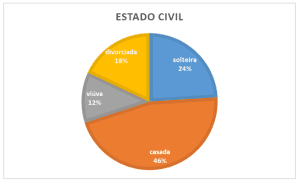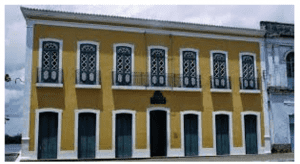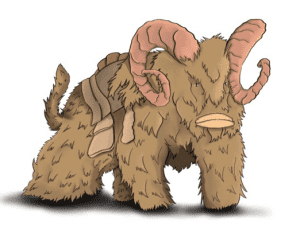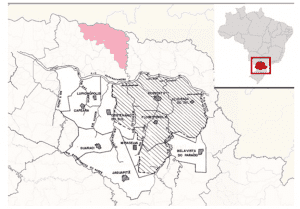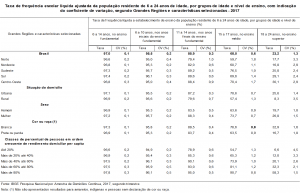ORIGINAL ARTICLE
CORREIA, Reinaldo Isidoro Ribeiro [1], MARTINS, Islane Cristina [2]
CORREIA, Reinaldo Isidoro Ribeiro. MARTINS, Islane Cristina. The process of slavery, freedom and identity in historiography from the black perspective: A review. Revista Científica Multidisciplinar Núcleo do Conhecimento. Year 05, Ed. 11, Vol. 15, pp. 59-70. November 2020. ISSN: 2448-0959, Access Link: https://www.nucleodoconhecimento.com.br/history/a-review
SUMMARY
Introduction: Historiography from the perspective of the negro together with methodology, teaching practices and teaching materials are necessary to destigmatize old conceptions and labels donate black people who have been enslaved over the centuries, as a wild and passive people, who did not resist slavery, much less fought to conquer their freedom. Objective: The aim of this study was to conduct an integrative review of the literature in order to understand slavery, freedom and identity in historiography from the point of view of the negro. Materials and Methods: A survey of the literature was carried out in August 2020, in the periodic databases CAPES – Coordination for the Improvement of Higher Education Personnel and Google Acadêmico. The search allowed the identification of 06 articles appropriate to the established criteria. Results: Of the 06 articles reviewed, 100% point to the use of new methods and the expansion of sources to obtain new interpretative approaches on black historiography. Conclusion: The articles indicate that rewriting the historiography of slavery, freedom and identity from the black perspective was and remains a challenge, because every historical concept is based on research from the point of view of the colonizing white man.
Keywords: Black Diaspora, slavery, freedom, identity, historiography.
1. INTRODUCTION
The African Diaspora was the mass displacement of the natives in a forced way, to exercise slave labor of the most diverse orders in the colonies of the Americas especially in Brazil, this phenomenon was very similar to the Jewish holocaust (ARAÚJO; CHAMBER, 2019).
However, textbooks and historiography omit or relegate little emphasis on this human tragedy that crossed the Atlantic Ocean during the arrival of settlers in Brazil until 1888, a period of almost four centuries (ARAÚJO; CHAMBER, 2019).
In this sense, slavery was a lasting institution that had as logic the Atlantic trade and slave trade in order to supply the colonies with human material to meet the most diverse demands, such as working in plantations and crops to do domestic services (ARAÚJO; CHAMBER, 2018).
Thus, the slave system was a contradictory and perverse regime, it wounded the fundamental human principles, such as: life, dignity, equality and freedom. All this because of the economic and financial interests, which would generate profits for the state (LEITE, 2017).
Thus, even with the abolition of slavery in 1888 and the establishment of the republic in 1889, the dreams of freedom of former slaves were not widely met, so they were excluded from the electoral process and the right to vote because they were mostly illiterate, as well as suffered in various adverse situations, and soon understood that their struggle had not come to an end , that is, non-slavery did not mean freedom (ARAÚJO; CHAMBER, 2019).
In addition, there was in the period of slavery the process of coisification with the enslaved, that is, they transformed people into goods or products causing them to lose their identity, in this sense it is relevant to understand the individual stories to interpret the historical context both in Africa and/or Brazil and thus see the cultural identity of that oppressed people (ARANA, 2017)
With this, the study and description of history, the so-called historiography has been over the last decades, expanding its range of sources, as well as implementing new forms of approaches, to research complex and difficult subjects such as slavery and the Atlantic slave trade (ARAÚJO; CAMERA, 2018)
Thus, historiography from the perspective of the negro together with the methodology, teaching practices and teaching materials are necessary to destigmatize old conceptions and labels of black people who have been enslaved over the centuries, as a wild and passive people, who did not resist slavery, much less fought to conquer their freedom. Moreover, it is important to reinterpret the story by observing the side of the oppressed in the case in question the negro who was brought in a forced way to Brazil, because thus we avoid the reproduction of distorted stories, always privilegimos an aristocratic elite, legitimized by positivist and Eurocentric tales.
In this sense, the macro and micro understanding of history allows us to analyze and understand as close to the real as possible allied to this the impartiality to unsee the nature of the facts. In this aspect, the black person as an actor in historical studies is salutary, because it helps to break the paradigms of society, such as racial prejudice, reproductions of negative labels, as well as the improvement of quality of life in the sense of equality for all.
Therefore, the aim of this study was to conduct an integrative review of the literature in order to understand slavery, freedom and identity in historiography from the point of view of the negro.
2. MATERIALS AND METHODS
A survey of the literature was carried out in August 2020, in the periodic databases CAPES and Google Scholar. The descriptors used were: ”Black Diaspora’ AND ”Slavery’ AND ”Freedom’ AND ”Identity” AND ”Historiography’ in all databases. We selected 06 articles and included according to the eligibility criteria according to Figure 1. The inclusion criteria were: articles in English, Spanish and Portuguese in the last five years, involving the process of slavery, freedom and identity in historiography from the black perspective. Exclusion criteria were literature review articles.
Figure 1. Flowchart and selection criteria and inclusion of the papers.
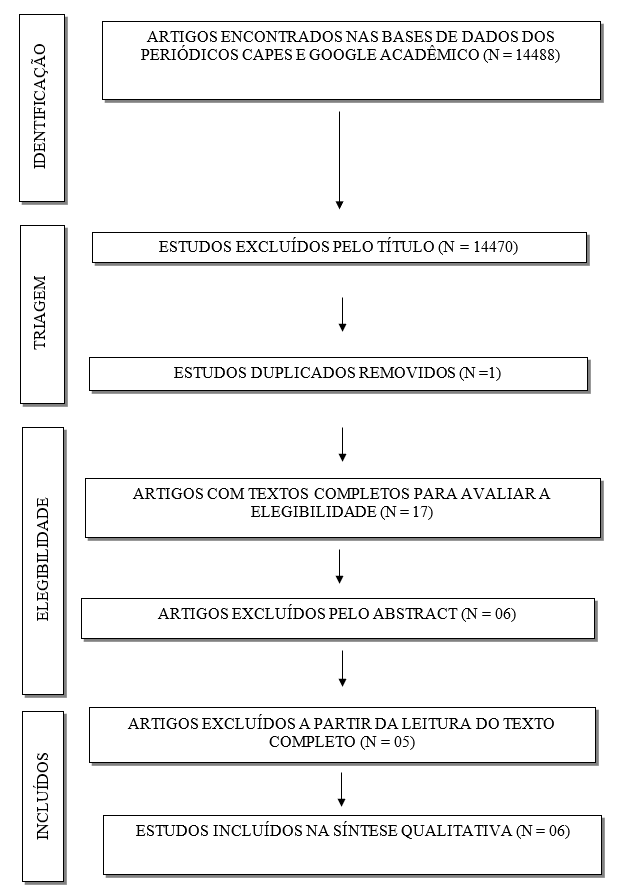
3. RESULTS
The results of the present study are found in Table 1.
Table 1 – Statement of the articles that are part of the Integrative Review
| #N | Date | Title | Authors | Periodic | Goals | Results |
| 1 | 2019 | Repensando o tráfico atlântico de escravos: Possibilidades, perspectivas e representação didática de um tema historiográfico. | Adriana Ribeiro de Araujo
Bruno Augusto Dornelas Câmara |
Diálogos | To understand how the theme on the Atlantic slave trade is approached methodologically in history textbooks. | It is notorious that there is an attempt to adapt the historiography of the theme to historiography of history, even if briefly, but a concern with the human aspect of the slave trade is perceived. |
| 2 | 2019 | Avanços e rupturas nas produções da Intelectualidade Africana e suas influências nos estudos Afro-Brasileiros | Lidiana Emídio Justo da Costa | Porangatu | Think about the development of historiography in Africa, as well as its induction in Afro-Brazilian studies. | It was observed that the Brazilian studies that analyzed the themes related to Africa did not have a temporal synchrony regarding the development of African historiography, but at a later time there was an intertwining. Issues such as enslaved black insubordination, resistance and negotiations within a hostile system are issues very close to those seen in the so-called historiography of African superiority. |
| 3 | 2018 | Interpreting Black History: Toward a Black History Framework for Teacher Education | LaGarrett J. King | Urban Education | Carefully analyze the understanding of teachers in early series the mastery of black history. | The evidence noted was that the teachers of the initial grades have critical and non-critical knowledge about black history. |
| 4 | 2018 | Atlantic Slavery and the Slave Trade: History and Historiography | Daniel B. Domingues da Silva and Philip Misevich | Oxford Research Encyclopedia | Show the transformations that occurred in the interpretative and theoretical mode on the theme of slavery and the slave trade as well as the new panorama in such issues. | The use of new forms of methodological approaches has opened the horizon for new results in this way historians are proving to be quite adaptable and thus cannot point out which path they are going. |
| 5 | 2017 | Tráfico atlântico, escravidão e resistência no Brasil | Maria Jorge dos Santos Leite | História da África e de Estudos da Diáspora Africana | Recall the process of african diaspora until the formation of quilombolas in Brazil researching the forms of resistance of the enslaved. | The enslaved presented from the beginning of the African diaspora various forms of resistance, being very common: revolts, escapes, murders, suicides, sabotage, in addition to the formations of quilombos. In this aspect it is perceived that the process of enslavement was a situation of struggle and at no time was accepted with passivity by the enslaved. |
| 6 | 2017 | Balanço historiográfico sobre América as insurgências de africanos (as) e afrodescendentes contra a escravidão em América. | Paola Vargas Arana | XII Jornada de Estudos Históricos | Discuss the events in the Hispanic colony of New Granada in the period of the sixteenth and seventeenth centuries pertinent the insurgencies of Africans and the diaspora to face slavery in America. | The process of insurgencies of Africans is currently observed by a new perspective which has new alternatives and interpretative approaches. |
Source: The researcher himself
4. DISCUSSION
The aim of this study was to conduct an integrative review of the literature in order to understand slavery, freedom and identity in historiography from the point of view of the negro.
In this sense, it was analyzed that the ways of researching the history of black people enslaved and brought to Brazil should be thought through a joint relationship, the triad: methodology, teaching practice and didactic material (ARAÚJO; CHAMBER, 2019).
In this context, since 1980, studies on slavery in Brazil took a new form of analysis, through new sources and perspectives, the Annalles school was a reference as well as the new African school (COSTA, 2019).
Therefore, new forms, methods and sources were crucial elements to think about a new history of the enslaved black people, in order to tell the version of the facts through the oppressed (SILVA; MISEVICH, 2018).
Thus, blacks were seen as central actors rather than mere victims, they are approaches inspired by the Civil Rights Movement of the United States, of second-wave feminism and global decolonization campaigns (SILVA; MISEVICH, 2018).
Thus, the concern to point out the enslaved as historical actors emphasizes the logic of survival and resistance, contrary to pacifism and acceptance that is perpetuated in positivist historiography (COSTA, 2019).
Thus the process of resistance in the slave system was as intense as slavery itself. Several forms of resistance have been employed by the enslaved, from their withdrawal in Africa to the ports here in Brazil (LEITE, 2017).
However, the way we interpret the history of black people can impact how we relate in today’s daily life with blacks and this can be reproduced in a naturalized way for a long time (KING, 2018).
In view of this, it is very important for the teachers of the initial series to have mastery over the history of the black in society, as well as to know how to reproduce for the students in order to show the aspects of the same story, both on the oppressive and oppressed side (KING, 2018).
In this logic it is important to know what it is to be black in the historical sense and not only to understand black history in a limited and distorted view based on white and positivist epistemic paradigms (KING, 2018).
Moreover, the teacher of initial series is understood as a transforming element in society, in black history, the teacher must represent the liberation of history including black perspectives and not delimiting to white epistemology (KING, 2018).
Thus, the National Education Guidelines and Bases Act (LDBEN) endorsed the federal constitution of 1988. That is, determining that: “the teaching of the history of Brazil will take into account the contributions of the various ethnic groups to the formation of the Brazilian people, especially the indigenous, African and European matrices” (art. 26, §4º) (ARAÚJO; CHAMBER, 2019).
In this aspect another very important factor for the Afrodescendant population was the conquest and approval of law 10,639 of January 9, 2003, making it mandatory to include Afro-Brazilian History and Culture in the official school curriculum (ARAÚJO; CHAMBER, 2019).
Thus, in the 1950s, research on the rebellions of the enslaved associated with leftist movements and the black movement became common due to the similarity of the issues and the dichotomous relationship between oppressed and oppressor (ARANA, 2017).
5. CONCLUSION
The aim of this study was to conduct an integrative review of the literature in order to understand slavery, freedom and identity in historiography from the point of view of the negro.
The process of slavery, freedom and identity in historiography from the perspective of the negro has been developed in a very dynamic way, due to the new forms of approaches and sources that are helping to reinterpret the history of Afrodescendants.
This is due to the fact that the researchers, on the subject pertinent to slavery in the 1980s, are based on the new concepts of annales’ school and the new African school regarding the search for historical facts.
Thus rewriting the historiography of slavery, freedom and identity from the black perspective was and continues to be a challenge, because every historical concept is based on research from the point of view of the colonizing white man.
Therefore, the breaking of paradigms is necessary and reinterpreting history is a way of understanding what happened in this process of enslavement of black man. Thus it is perceived that through the reading of the articles the black people fought for their freedom, even being enslaved, they maintained their beliefs, values and culture. Contrary to the intention of wanting to cosify the Afrodescendant people as barbarians and savages, this in traditional Eurocentric literature, the historiography in a look seen by the negro demystifies these dogmas of barbarian, wild and passive people.
REFERENCES
______. Lei n. 10.639, de 09 de Janeiro 2003. Historia da Cultura AfroBrasileira. Disponível em: https://www.planalto.gov.br/ccivil_03/leis/2003/l10.639.htm. Acesso em 10 de out. 2020.
ARANA, P. Anais da XII Jornada de Estudos Históricos professor Manuel Salgado PPGHIS/UFRJ V.3. Rio de Janeiro, 2017. Disponível em: https://www.jornadaeh.historia.ufrj.br/index.php/mesa-15-historiografia-teoria-e-metodologia-da-historia/. Acesso em 16 out. 2020.
ARAÚJO, A.; CÂMARA, B. Repensando o tráfico atlântico de escravos: Possibilidades, perspectivas e representação didática de um tema historiográfico. Revista Diálogos – N.° 21 – Mar. / Abr. – Pernambuco, 2019, (p.195-222). Disponível em: https://www.revistadialogos.com.br/Dialogos_21/Dialogos_21_capa_creditos.pdf. Acesso em 15 out. 2020.
BRASIL. Diretrizes e Bases da Educação Nacional: Lei n. 9394/96, de 23 de
dezembro de 1996: estabelece as diretrizes e bases da educação nacional.
Brasília: Diário Oficial da União, 1996.
COSTA, L. Avanços e rupturas nas produções da Intelectualidade Africana e suas influências nos Estudos Afro-Brasileiros. Revista de História da UEG, v. 8, n. 1, p. e811901, 6 fev. 2019. Disponível em: https://www.revista.ueg.br/index.php/revistahistoria/article/view/8360. Acesso em: 15 out. 2020.
KING, L. “Interpreting Black History: Toward a Black History Framework for Teacher Education.” Urban Education, Columbia, EUA, 2018. Advanced online publication. Doi:10.1177/0042085918756716. Disponível em: https://www.researchgate.net/publication/323341466_Interpreting_Black_History_Toward_a_Black_History_Framework_for_Teacher_Education. Acesso em: 16 out. 2020
LEITE, M. J. dos S. Tráfico atlântico, escravidão e resistência no brasil. Sankofa, [S. l.], v. 10, n. 19, São Paulo, 2017 (p. 64-82). DOI: 10.11606/issn.1983-6023.sank.2017.137196. Disponível em: http://www.revistas.usp.br/sankofa/article/view/137196. Acesso em: 16 out. 2020.
SILVA, D ; MISEVICH, P. Atlantic Slavery and the Slave Trade: History and Historiography. Oxford Research Encyclopedias, Oxford, ING, 2018 Advanced online Publication Doi: 10.1093/acrefore/9780190277734.013.371. Disponível em: https://oxfordre.com/africanhistory/browse?btog=chap&page=2&pageSize=20&sort=titlesort&subSite=africanhistory. Acesso em 16 out. 2020.
[1] Specialist in Public Administration – UNILAB.
[2] Guidance counselor. Master in Neurosciences POSNEURO/UFPE.
Submitted: October, 2020.
Approved: November, 2020.

